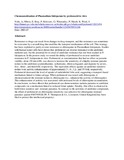| dc.description.abstract | Resistance to drugs can result from changes in drug transport, and this resistance can sometimes be overcome by a second drug that modifies the transport mechanisms of the cell. This strategy has been exploited to partly reverse resistance to chloroquine in Plasmodium falciparum. Studies with human tumor cells have shown that probenecid can reverse resistance to the antifolate methotrexate, but the potential for reversal of antifolate resistance has not been studied in P. falciparum. In the present study we tested the ability of probenecid to reverse antifolate resistance in P. falciparum in vitro. Probenecid, at concentrations that had no effect on parasite viability alone (50 microM), was shown to increase the sensitivity of a highly resistant parasite isolate to the antifolates pyrimethamine, sulfadoxine, chlorcycloguanil, and dapsone by seven-, five-, three-, and threefold, respectively. The equivalent effects against an antifolate-sensitive isolate were activity enhancements of approximately 3-, 6-, 1.2-, and 19-fold, respectively. Probenecid decreased the level of uptake of radiolabeled folic acid, suggesting a transport-based mechanism linked to folate salvage. When probenecid was tested with chloroquine, it chemosensitized the resistant isolate to chloroquine (i.e., enhanced the activity of chloroquine). This enhancement of activity was associated with increased levels of chloroquine accumulation. In conclusion, we have shown that probenecid can chemosensitize malaria parasites to antifolate compounds via a mechanism linked to reduced folate uptake. Notably, this effect is observed in both folate-sensitive and -resistant parasites. In contrast to the activities of antifolate compounds, the effect of probenecid on chloroquine sensitivity was selective for chloroquine-resistant parasites (patent P407595GB [W. P. Thompson & Co., Liverpool, United Kingdom] has been filed to protect this intellectual property) | en |


